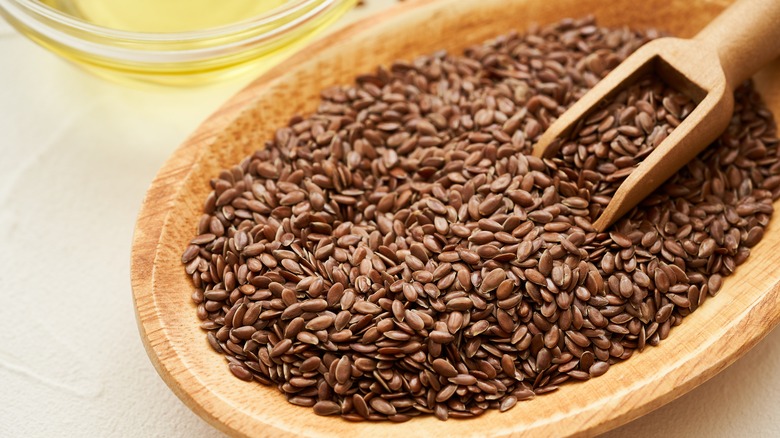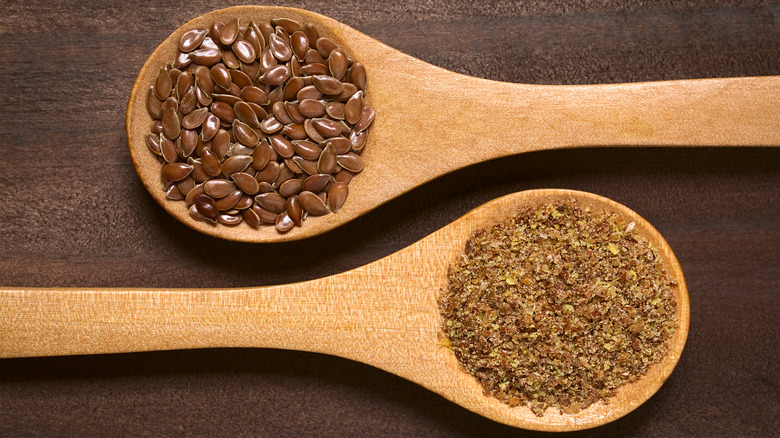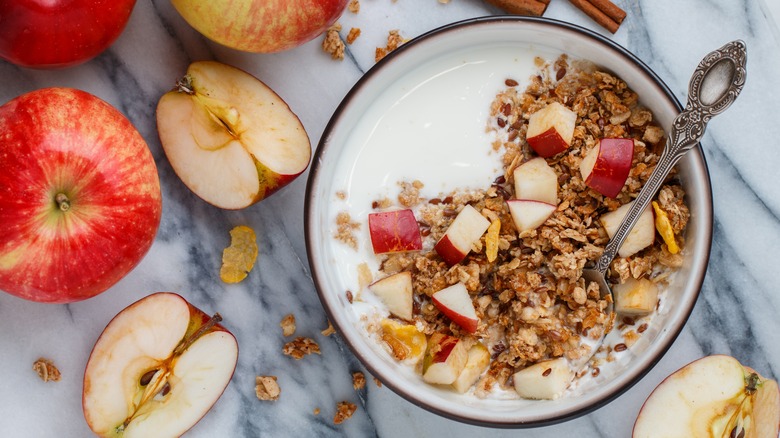How To Eat Flaxseeds Without Totally Changing Up Your Meals
Rich in healthy fats, flaxseeds are widely used as food and medicine. One ounce boasts nearly 8 grams of fiber, 5 grams of protein, and 12 grams of fat, including over 400% of the recommended daily amount of omega-3s. You'll also get large doses of copper, magnesium, phosphorus, manganese, iron, and vitamin B1. Moreover, these tiny seeds contain up to 800 times more lignans than other foods, notes the Cleveland Clinic. Lignans are estrogen-like compounds that protect against oxidative stress, heart disease, and inflammation.
This functional food may help lower blood pressure and cholesterol levels, according to 2019 research published in the journal Nutrients. Additionally, the fiber in flaxseeds regulates blood sugar, leading to a lower risk of diabetes. Lignans and other phytoestrogens can ward off cancer, whereas omega-3s promote brain health. Some studies also found that flaxseeds have protective effects on the gut, increasing the number of beneficial bacteria. Plus, they may help prevent constipation and aid in digestion due to their high fiber content.
Nowadays, manufacturers add flaxseeds to crackers, bread, granola, energy bars, and other products; but most foods contain whole seeds, which pass through your system undigested. A better option is to use ground flaxseeds or flaxseed meal so you can fully reap their benefits.
What's the right way to eat flaxseeds?
Flaxseeds have a tough outer shell that your body cannot break down. Their outer shell does contain some fiber and may aid in digestion, but that's pretty much about it. If your body cannot digest it, it won't fully absorb the protein, calcium, potassium, and other nutrients. Therefore, it's best to grind the seeds before consumption.
Another option is to use flaxseed meal, which has a finer texture than ground flaxseeds. This makes it ideal for homemade bread and desserts, such as oatmeal cookies, cakes, muffins, and pancakes. Plus, it's an excellent substitute for eggs. Simply mix a tablespoon of flaxseed meal with 3 tablespoons of water until smooth to replace 1 egg in your recipes. Or go one step further and use flaxseed meal to replace up to 20% of the flour in baked goods.
Another difference between whole flaxseeds and flaxseed meal or ground flaxseeds lies in their shelf-life. Whole flaxseeds can last up to 12 months, but their shelf-life decreases to three or four months after grinding. Both flaxseed meal and ground flaxseeds can go bad in as little as one week if stored at room temperature, so it's best to keep them in an airtight container away from light and heat. You can also store them in the fridge to prevent rancidity. The same goes for whole flaxseeds, which usually keep better in the refrigerator than in the pantry.
How to supercharge your meals with flaxseeds
Flaxseeds have a rich, nutty flavor that will take your cooking to new heights. The best part is, you can reap their benefits without changing up your meals. Sprinkle the ground seeds over salads, oatmeal, yogurt, and puddings; mix them into soups; or add them to smoothies. Alternatively, incorporate them into homemade power bars, meat patties, granola, pastries, hummus, or nut butters.
You can also sprinkle the seeds on cooked veggies or pasta dishes. Mix them with cinnamon or nutmeg, and then add them to applesauce or canned pumpkin for a nutty aroma. Note that flaxseed meal and ground flaxseeds can be used interchangeably in some recipes. For example, you can make banana bread with either ingredient, depending on your preferences. Another option is to add flaxseeds to protein shakes for extra fiber and omega-3s.
As a general rule, stick to 1 or 2 tablespoons of ground flaxseeds per day. Despite their small size, the seeds are high in fiber and can upset your stomach if consumed in excess. Samantha Brown, a dietetic intern at Tufts University, warns that eating large amounts of flaxseeds may cause diarrhea or constipation, bloating, nausea, and other gastrointestinal symptoms. For this reason, it's important to consume them in moderation, along with plenty of water, tea, or other fluids. Also, note that flaxseeds may not be safe for those with low blood pressure, blood disorders, or digestive conditions.


